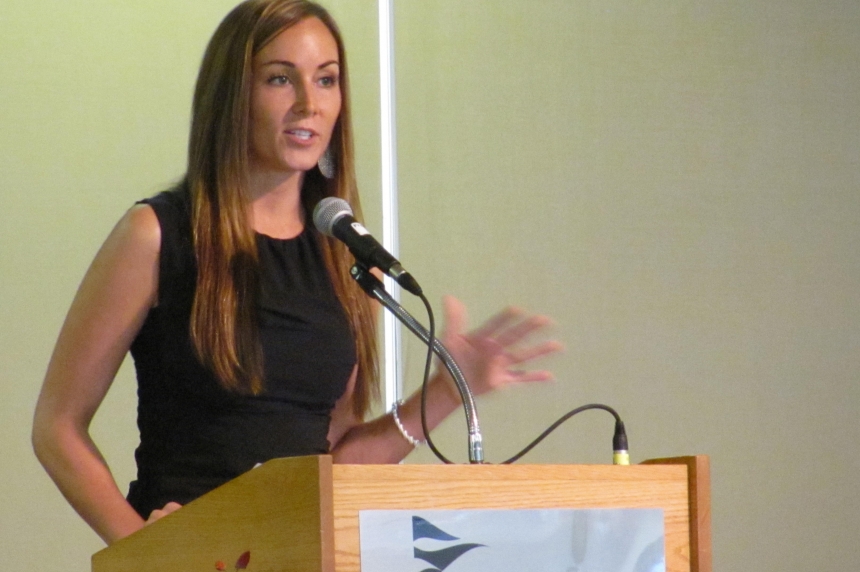Blog Post
An evening with Amanda Lindhout
By Jonathon Van Maren
I spent a fascinating evening Monday night at the Roy Thomson Hall, listening to journalist Amanda Lindhout tell her story of being kidnapped and held for seventeen months by Somali militants. Since being freed and returning to Canada in November of 2009, Amanda has co-authored a memoir of her experiences, A House in the Sky, begun a foundation to empower women and girls in Somalia, and travels the world telling her story.
It was strange to watch a poised, sophisticated, and well-dressed young woman stand on the stage of a beautiful Toronto concert hall and, in a clear although at times quivery voice, describe getting kidnapped at gunpoint by militants, being locked in darkness for months at a time, and raped, day after day, by those she referred to as Somali “boys.” It must have struck Amanda, too, because she mentioned it several times with awe in her voice.
Her message of compassion was one I was expecting to hear, but still struck me in a way that caught me off-guard. When she described having out of body experiences where she would be looking down at the battered girl from Red Deer, Alberta, suffering horribly beneath the cruel kidnapper who was “hurting” her, and how she focused on forgiveness in her mind, over and over again, I found it hard to grasp. The deeper the cruelty, the more profound and beautiful the forgiveness. But “hurt people,” Amanda explained—and I’d heard the saying so many times myself, “hurt people.”
Listening to Amanda’s story reminded me so much of my conversation with Rwandan genocide survivor Imaculee Illibagiza, who explained to me, in her thick accent and lovely voice, how she had forgiven the man who murdered her family, and had tried to butcher her, too. I remember being stunned and humbled listening to her describe, with joy in her voice, how full and free she’d felt when she forgave a man who had robbed her of some of the most precious people in her life. Listening to Amanda talk about how grateful she was for the sight of the sky and the touch of the breeze, after what she had been through, the same feelings came back. Here I was, fresh from being cranky at Toronto traffic, and a woman who had spent months in a Somali rape dungeon was saying, with a smile on her face, how she felt so often like bubbling over with gratitude.
Amanda Lindhout is a woman remarkably free of bitterness. I say remarkably, of course, because of the indignities and atrocities she suffered at the hands of rough and angry men. Even when she and her fellow captive, Nigel, managed to escape and break free to flee to a local mosque, none of the two hundred men inside tried to help her. Instead it was a woman about her mother’s age who, with tears in her eyes, clung to Amanda and tried to shield her from her machine-gun wielding pursuers. Amanda was dragged by her ankles from the place of worship, and as she was thrown in the truck, she saw the kidnappers advancing on the woman who had tried to save her. With tears in her eyes, Amanda recalled hearing a gunshot out of sight. When asked, she admitted she didn’t know why no man tried to save her.
One reason lies in the answers given to her in two Calgary mosques she visited upon her return to Canada. Her captors had informed her that their sexual abuse of her was sanctioned by Islamic law, due to the verse in the Qu’ran that permitted Muslim men to use “those whom your right hand possesses” as they saw fit. Amanda wanted to ask some Canadian Muslim leaders if that was, in fact, the right interpretation of those words. She stunned the Toronto audience into silence when she admitted that, “at both mosques they told me that what had happened to me was unfortunate, but that it was in fact permissible under Islamic law.” That is in all likelihood why no man stepped forward to assist her.
At the beginning of her story, Amanda told the audience that she hoped we would leave the concert hall with a little more compassion. In that, she certainly succeeded. I’m sure many of us were sitting in our seats engaged in private purges of self-pity, petty grudges, and needless irritations. After hearing someone who has been through so much talk with such thankfulness about the blessings she’d been given and the compassion she felt even for those who had inflicted so much pain on her, I, at least, left the hall thoroughly chastised.









Incredible. I do not think I possess such power to forgive.
None of us do really, John. It’s pure grace from God to be able to do that.
This isnt popular but I must: christ redeems, Mohommed condemns.
Truth on so many fronts. Forgiveness. Gratitude. Warning. Whoever thinks we are safe in America with the rapid advances of Islam had better think again. Ever read Not Without My Daughter?
A remarkable woman. Thanks for telling us about her, Jonathon!
Stunning courage in the face of barbaric evil. May the God of all Creation bless her, mightily.